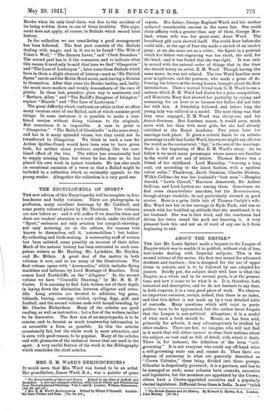MRS. E. M. WARD'S REM.INISCENCES.f
IT would seem that Mrs. Wri-ird was bound to be an artist. -Her grandfather, .James'Ward, R.A., was a painter of great • The Encyclopedia of Sport and (lames. Edited by the Earl of Suffolk and Berkshire. A new and enlarged addition, with Colour Plates and Illustrations from PhotogmphsandDrawings. Vols.L and IL London : William Heinemann.
6d. per rot] • •
t ifie.3. M. Ward's Esminiscsnies. . Edited by'Elliqtt O'Donnell. London :
43it Isaac Pitnian and Sons. [12s. 6d. net.1 .
repute. Her father, George Raphael Ward, and her mother achieved considerable success in the same line. She could claim affinity with a greater than any of them, George Mor- land, whose wife was her great-annt, Anne Ward. The hereditary gift soon showed itself. She could draw before she could talk ; at the age of four she made a sketch of an uncle's pony; at six she came out as a critic; the figure in a portrait which her father was engraving was too short, she said, for the head; and it was found that she was right. It was only in accord with the natural order of things that in due time she should marry an artist, E. M. Ward. Though having the same name, he was not related. The two Ward families were near neighbours, and the postmen, who made a point of de- livering the letters at the wrong houses, brought about the first introduction. Then a mutual friend took G. R. Ward to see a cartoon which E. M. Ward had drawn for a prize competition, and Henrietta Mary first showed her partiality by crying and screaming for an hour or so because her father did not take her with him. A friendship followed, and before long the young lady was utilized as a model. The next thing was that they were engaged ; E. M. Ward •was thirty-one and his fiancée fourteen. But fourteen meant, it would seem, much more with her than with most girls, for she had already exhibited at the Royal Academy. Two years later ler marriage took place. It gives a certain finish to an artistic genealogy to add that Leslie Ward, known,we might say, all over the world as the caricaturist," Spy," is the son of the marriage. Such is the beginning of Mrs. E. M. Ward's story. As we follow it we meet many personages whose names are familiar in the world of art and of letters. Thomas Moore was a friend of her childhood. Lord Macaulay, "wearing a long coat, cut according to the latest fashion, with a spotless velvet collar," Thackeray, Jacob Omnium, Charles Dickens, Wilkie Collins—he was her husband's " best man "—Douglas Jerrold, " Lewis Carroll," Harrison Ainsworth, Sir Arthur Sullivan, and Lord Lytton are among them. Sometimes we find some characteristic anecdote, but the Reminiscences, though always readable, do not particularly abound in good stories. Here is a grim little tale of Thomas Carlyle's wife. Mrs. Ward saw her in her carriage in Hyde Park, and was so struck with her huddled-up attitude that she mentioned it to her husband. She was in fact dead, and the coachman bad driven her twice round the park not knowing it. A very pleasant book this and not an ill word of any one in it from beginning to end.








































 Previous page
Previous page